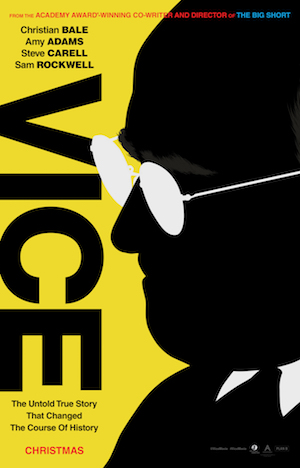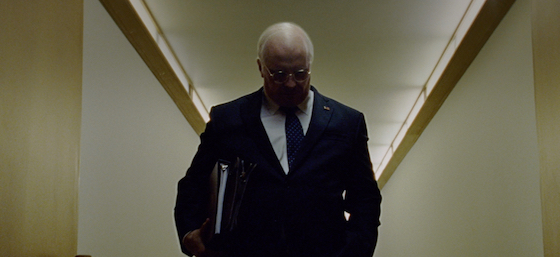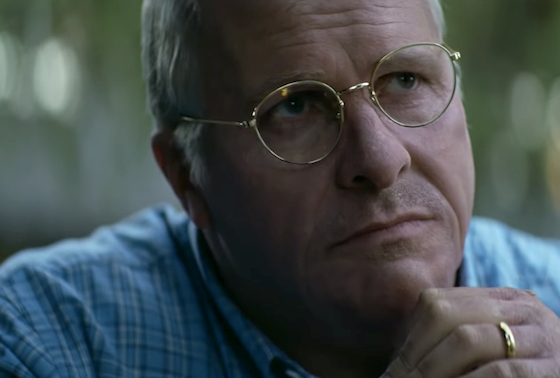

[Rating: Rock Fist Way Up]
A sharp-fanged biopic sporting a veritable Murderer’s Row cast, Vice pulls off the tricky feat of entertaining as well as educating. Tracking the political maturation of one of history’s most cunning and ruthless politicians, director Adam McKay manages to also contextualize maybe the most consequential decade in American history. In so doing, the film manages to both look back as well as forward, setting the stage for a ubiquitous sociopolitical apparatus that has seeped into every crevice of American life, and has fundamentally altered the course of human history.
A narrator (Jesse Plemons) walks the audience through the early adulthood of Dick Cheney (Christian Bale), whose aimless, drunken ramblings in the 1960s lead him to a reckoning with wife Lynne (Amy Adams). Lynne married Dick because she saw a spark of greatness in him, yet failures in college and in the private sector push her to an ultimatum: either Dick start doing something with his life, or she’s going to walk. Whatever else a person can say about the man, Vice implies that Dick is nothing if not a devoted husband and father, so the coming-to-Jesus chat with Lynne sparks something in him that leads to a career in local politics, and later, work in Washington D.C.
The film follows Dick as he falls under the spell of Nixon cabinet member Donald Rumsfeld (Steve Carrell), who takes the young Wyoming roughneck under his wing as a protégé. Immediately sold on the hard-hearted pragmatism and boy’s club mentality of the Republican party, Dick throws himself into the carnivorous waters of Nixon’s Washington, cultivating small government, big-Executive ideologies that would define his political future. Over time, Cheney manages to learn from the mistakes of his colleagues while retaining the most effective aspects of their governing philosophy, emerging from the 70s and 80s as a leading voice within the party, and with a raft of political, corporate, media, and judicial connections to-boot.

The downside of being a humorless, calculating, political animal devoid of remorse is that it doesn’t endear one to the masses, which leads to Dick taking a job in the private sector in the 90s. And were it not for George W. Bush (Sam Rockwell) needing a heavy-hitting, battle-scarred party loyalist for his 2000 presidential bid, Dick might well have remained out of the game. Armed with promises to act with authority in energy, foreign policy, and several other sectors not usually reserved for a vice president, Dick goes back to work in Washington for Bush-2, where he finds that a cataclysmic national emergency (9/11) can give him all the authority and power a man could want.
As Vice proceeds from here, the audience watches as Dick uses more than three decades of political experience to consolidate power and act as a de facto co-Executive from 2001-2008, setting the White House’s agenda on pretty much every impactful policy decision of that administration. Focused, ruthless, and entirely sure that he knows better than any of his colleagues (or the citizenry he works for), Dick mobilizes the full force of the right-wing media and Republican judiciary to push his agenda forward, expanding the powers of the presidency at the expense of due process, legislative authority, and the soul of the nation. Republican donors and private business contacts Dick has cultivated for decades reap unfathomable benefits for their patronage, while a two-front war in Iraq and Afghanistan feeds their coffers and satisfies their conservative ideologies. It’s a stunning indictment of not just a man, but a political party that owes its current existence to Dick Cheney, and McKay and Bale manage the feat beautifully.

And on that note, it is impossible to overstate just how fully Bale inhabits the role of Dick Cheney, whose mannerisms, posture, voice inflection, and basic appearance present almost no differentiation from the real thing. The performance is almost entirely subterranean, however, forcing Bale to use the full range of his talents as an actor. In this film, as in life, Cheney is not demonstrative or theatric: there’s no Oscar clip moment, here, or anything to save for a highlight reel. Carrell and Rockwell, both outstanding, have much more sizzle on-screen, and are afforded more to do on the surface, yet Bale is no less effective when squinting with silent purpose or delivering a measured, pointed remark.
Adams is no less brilliant as Lynne Cheney, the devoted true believer who never wavers in her support of Dick after he heeds her advice and pulls himself back from the booze and brawl-fueled abyss. McKay is careful to paint Dick as ruthless and immoral, yet human nonetheless: the marriage to Lynne serving as a catalyst for this kernel of humanity. It would have been easy to cast Dick as a power-hungry war criminal devoid of a conscience or any redeeming qualities, yet his unconditional love of family, particularly for his LGBTQ daughter, Mary, gives him depth. Like any good villain, Dick doesn’t think he’s right, he knows it, making his actions in “defense” of his country all the more tragic when considering the immeasurable harm his policies inflicted on the United States and the world.
Opening this week, Vice follows up McKay’s masterful work with The Big Short by blending dynamic character work with a large-scale sociopolitical autopsy. Pulling apart the complex strands of dozens of individuals over the course of several decades vis a vis an exploration of one man’s brutal journey through the halls of power, the film tells a large and small story at the same time. Light on its feet with a thin layer of humor laid over top the whole effort, Vice is just interesting and dynamic enough to make a film about Dick Cheney must-see entertainment. For that alone, McKay and co. deserve all the plaudits that can be afforded in an era where comic book movies and pop star remakes on their 4th incarnation thrive.





Comments on this entry are closed.